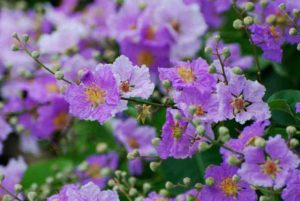Banaba Leaf Extract (Lagerstroemia speciosa) is a species of crepe myrtle tree that is native to the Philippines and Southeast Asia. People use the leaves to make medicine.
Contents
Uses
- In alternative medicine, banaba is touted as a natural remedy for the following conditions:
- diabetes
- high blood pressure
- high cholesterol
- kidney disease
- metabolic syndrome
- urinary tract infections
- In addition, banaba is often marketed as a natural weight loss aid. Some proponents also suggest that banana can aid in detox and enhance liver health.
Benefits
- Diabetes: Findings from laboratory studies and animal-based research suggest that banaba may help control diabetes. In a study published in Bioscience, Biotechnology, and Biochemistry in 1996, for instance, scientists demonstrated that treating diabetic mice with banaba extract helped protect against elevated blood sugar levels.
- In addition, banaba appeared to reduce total cholesterol levels. In 2003, the Journal of Ethnopharmacology published a study finding that type 2 diabetes patients treated with banaba extract for two weeks experienced a significant reduction in blood sugar levels. The number of study participants is unknown.
- Weight Loss: Banaba may help fight obesity, according to a study published in the Journal of Nutritional Science and Vitaminology in 1999. In an experiment involving obese mice, researchers found that adding banaba to the animals’ diets helped prevent weight gain. What’s more, banaba-fed mice were less likely to experience buildup of triglycerides (a type of harmful blood fat).
Cautions
- Banaba is POSSIBLY SAFE for most people when taken by mouth on a short-term basis. The long-term safety is unknown.
- Special Precautions & Warnings:
- Pregnancy and breast-feeding: Not enough is known about the use of banaba during pregnancy and breast-feeding. Stay on the safe side and avoid use.
- Diabetes: Banaba can affect blood sugar control, so people with diabetes should monitor their blood glucose levels closely. If you have diabetes, it’s best to check with your healthcare provider before starting banaba.
- Low blood pressure. Banaba might lower blood pressure. In theory, taking banaba might make blood pressure become too low in people with low blood pressure.
- Surgery: Banaba might affect blood sugar levels and could make blood sugar control more difficult during and after surgery. Stop using banaba at least 2 weeks before a scheduled surgery.
Interactions
- According to DiabetesHealth.com, banaba leaf extract can also interact with other medications or herbal supplements. For example, banaba may cause blood glucose to be excessively lowered when combined with drugs that can cause hypoglycemia, such as sulfonylureas, or with other alternative medicines that have hypoglycemic qualities. As a result, DiabetesHealth.com suggests that the dosages associated with banaba leaf extract medications may need to be adjusted in order to limit the risk of possible drug interactions in supplement users who take additional medications or herbs.
Other names
Banaba Extract, Banabalean, Corosolic acid, Crape Myrtle, Crepe Myrtle, Extrait de Banaba, Lagerstroemia flos-reginae, Lagerstroemia speciosa, Munchausia speciosa, Myrte de Crêpe, Pride-of-India, Pyinma, Queen’s Crape Myrtle
References
Source: WebMD, http://www.webmd.com/vitamins-supplements/ingredientmono-1089-banaba.aspx?activeingredientid=1089&activeingredientname=banaba
LiveStrong, http://www.livestrong.com/article/148291-banaba-leaf-extract-side-effects/
Verywell, https://www.verywell.com/the-benefits-of-banaba-89413
Image Source: http://3.bp.blogspot.com

